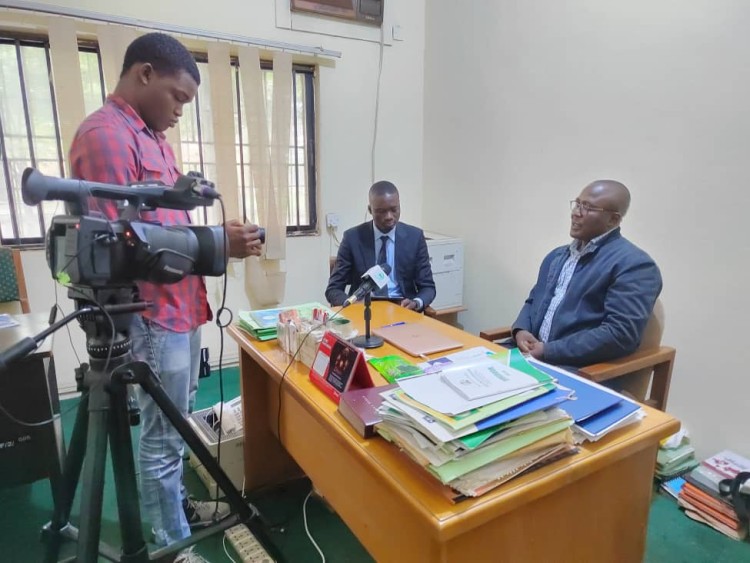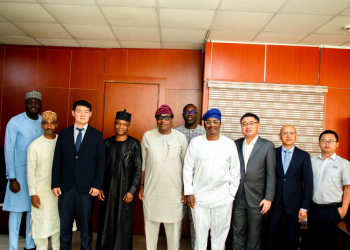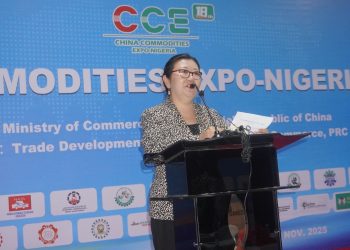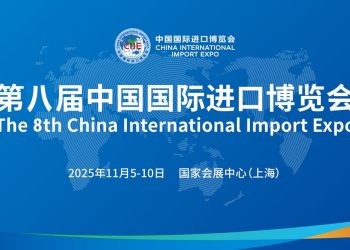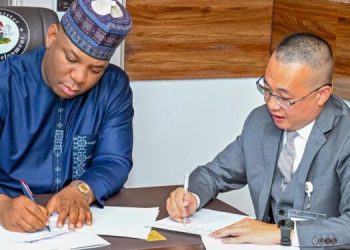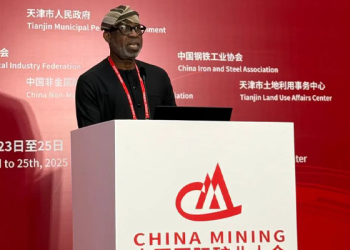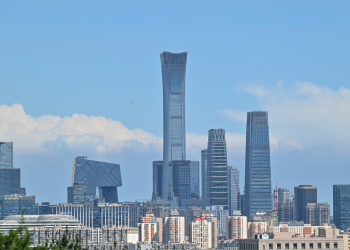In this interview, Dr Olalekan Babatunde, research fellow of the Institute for Peace and Conflict Resolution spoke to our correspondent on the trade and economic relations between Nigeria and the Peoples Republic of China.
Q: May we meet you?
Dr Olalekan: I am Dr Olalekan Babatunde. I am a research fellow of the Nigerian Institute for Peace and Conflict Resolutions in Abuja where I engage in peacebuilding and evidence practice for the country.
Q: Can briefly describe to us the nature of Nigeria’s foreign policy?
Dr Olalekan: The foreign policy of Nigeria since independence has been Africa-focused. You know Africa is the centrepiece of Nigeria’s foreign policy whereby we promote the interest of Africans across the sub-region. We look at those shared values, and beliefs to articulate our foreign policy document. The development, and protection of Nigerians either within or outside the country is the primary responsibility of the government.
Q: Nigeria and China have been having trade relationships since 1971. Can you run us through Nigeria-China trade relations?
Dr Olalekan: Last year, we marked 50 years of diplomatic relationship between Nigeria and China. Before 1971, Nigeria and China have related right from the time of Chairman Mao in the colonial era. We relate in trade and China supported Africa and Nigeria against colonialism and imperialism. Nigeria has done wonderfully well with China in terms of trade and economic relations. Before the formation of the Forum on China–Africa Cooperation (FOCAC) and even recently, we have been engaging across the border. We share a lot of similarities. Nigeria is a leading country in Africa, the most populous nation in Africa and China is the leading country in Asia and also the most populous nation in the world. Since we share similar characteristics and demographics, we have the same interests like how to feed our populations. These are the major factors that laid the background of the foreign policy of both nations. We both want to take care of our citizens and geopolitics. So the two interest meets. With the two interests, both created a common forum in 1971 to have shared prosperity, shared benefits for their citizens, people-to-people connectively, trade connectivity and so on.
Q: The Chinese government recently provided the capital needed for the revitalization of rail lines, airports, road networks and other critical infrastructures in Nigeria. How significant are these projects to the Nigerian economy?
Dr Olalekan: Since independence, we have seen the infrastructural gaps in the country. We have seen our relationship with the West. We have seen the inadequacies. The unequal relationship. We have also seen what China is bringing with no strings attached. China has given infrastructural support to Nigeria through trade and investment. You can see across the country in terms of infrastructural development in rail, ports, roads, bridges, energy, telecommunications and even in military and cultural exchanges. We have seen both countries forging closer relationships than many other countries in the world. We have seen the revitalization of the railway connecting major cities in the country. We have seen the Lagos-Ibadan rail project which was started by the Obasanjo administration from 1999 to 2007. We have seen Abuja-Kaduna, Kaduna-Kano and then Kano to Katsina rail projects. We have also seen plans to connect Lagos to the South-South, then from there to the Northeast. So we have seen the construction of railways across the country and through these constructions, people are being connected, trade is being harnessed and relationships are being re-established. Movements that used to take a longer time because of bad roads, and bad infrastructure are now taking a shorter time and are now more convenient for Nigerians to move from one location to another.
Q: How have these projects impacted average Nigerians?
Dr Olalekan: These Chinese interventions have improved the socio-economic well-being of the people. It has enabled employment for the youths. For instance, if you visit the computer village in Lagos, you will see youths involved in one form of skill or the other to earn a living. They are either repairing phones, and laptops or engaging in one form of trading activity. These engagements have deterred the youths from crime and joblessness. You can see how beautiful the airports are. They have added value to us. The youths are also engaged in mining and communities are also busy. People are engaged in one stage of the value chain and make income in the process. The trade volume between Nigeria and China as of 2021 was put at N20bn. We can all see the impact of this huge investment on our economy and daily life. Chinese interventions have greatly improved the socio-economic well-being of our people in different communities.
Q: Describe the role of Chinese companies in Human Capital Development and technology transfer in Nigeria
Dr Olalekan: Chinese companies have done a lot in this regard. For instance, Nigerians are now engaged in the learning of Solar Energy brought into the country by the Chinese. We now have Nigerians becoming specialists in the fabrication and repair of batteries, inverters and other components of solar energy. Courtesy of the Chinese, we have lots of Nigerians including ladies driving trains at the railway staions across the nation. You will see lots of Nigerians operating machines in Chinese companies. In irrigation, energy, manufacturing companies, and poultry, the skills transfer is there. They are doing intense in-house training for their Nigerian workers. Nigerians just want to be equipped with this knowledge in a more organized and systematic way. More Chinese companies should also come down to Nigeria and set up their businesses here. For example, two weeks ago, the association of Nigerian miners clamoured that Chinese firms come down to Nigeria and set up their companies to help the local economy grow. It is through this we can achieve development. Needs assessment, and corporate social responsibility must also be considered in setting up these companies in Nigeria.
Q: It has been argued in some quarters that the presence of Chinese business interest in Africa and Nigeria is a form of neo-colonialism aimed at promoting Chinese selfish interests. How true is this assertion?
Dr Olalekan: Every country has their foreign policy. But a country cannot develop alone hence the need to enter into cooperation. People will naturally want to cast aspersions because of the massive presence of Chinese business interests in Africa and Nigeria. But we have to look at the past. Where has the relationship with the Chinese taken us in the past 50 years? For example, in June 2022, we saw the G7 initiating the PGII (Partnership for Global Infrastructure and Investment) and initiated $600bn to rival BRI China in low-income countries. You can see that China BRI is making sense and that is why it is been rivalled. Mind you, this same G7 instituted the build back better world last year and there was no progress in it. So this June, they instituted the $600bn to rival China. We can see that China is on the right path. So I wish to see the two countries coming together, even more, stronger in the future.
Q: So Chinese presence in Nigeria is not for economic exploitation but a win-win situation?
Dr Olalekan: It’s a win-win situation but it now depends on the actors, the players. How are you playing the game? Is Nigeria strategic enough to make the most out of this relationship? China is not exploiting but when we don’t make that move to make it benefit our citizens, to make it a win-win relationship, definitely China will benefit more. When you look at this $20bn trade volume, you will see that China has about 90% investment. What we do more is export petroleum gas, iron ore, mineral resources and other agricultural products to China and import finished products in return from them. When I visited China in 2018, I saw the yearnings of Chinese companies wanting more from Nigeria. Are we ready to be strategic players? This is where we should look at.
Q: What other critical sector of the economy do you think the Chinese government should invest in Nigeria?
Dr Olalekan: We already have China involved in trade and investment. They have opened up ports, economic trade zones in Lekki and so on. I want them to do more in other areas like the establishment of a Lithium battery-making company and also in agriculture. When you invest in agriculture, you have food in abundance. This can be done because China is doing it in Ethiopia and other East African countries whereby every day, they are exporting to the United Kingdom. The majority of the food items sold in the United Kingdom are imported from Chinese companies in East Africa. The Chinese can also collaborate with the Nigerian government in ensuring peace so that agriculture and other businesses can thrive in Nigeria. We have abundance in this country. We have fertile ground, and cheap labour so we can engage with the Chinese to ensure peace. The Chinese have also partnered with the Nigerian military in providing hardware and some training. They can do more in ensuring a peaceful atmosphere in Nigeria for business to flourish.
Q: How can both nations strengthen economic and trade ties for mutual benefit?
Dr Olalekan: Both nations should come together and re-evaluate the 50 years of friendship. There are many things in FOCAC and BRI documents that can be looked at to inject some level of seriousness. More is expected from Nigeria. We should engage China more, we should re-strategize, and re-think the relationship so that we can have this shared prosperity that we have been talking about all these years.
Q: Where do you see Nigeria-China friendship in the next 20 years?
Dr Olalekan: I see them more active in the area of trade, investment, and exchanges. The two nations can be shining examples in diplomatic relations for other nations to emulate.
Q: How will you describe the Chinese people based on your visit to China?
Dr Olalekan: The Chinese people are hospitable. They are focused. The government loves the people and the people are obedient to the government. They are loyal to the leadership contrary to what we have been used to in this hemisphere. Wherever Chinese citizen goes, they are eager to return home because they love their government and vice versa. We need to learn from China and build that trust between the people and the government. The Chinese people can also support think tanks and civil societies. Think-thanks are working effectively in China. I saw a system whereby think tanks are actively involved from the grassroots up to the leadership and the party system. Nigeria can also incorporate think-thanks in development.
[End]





























